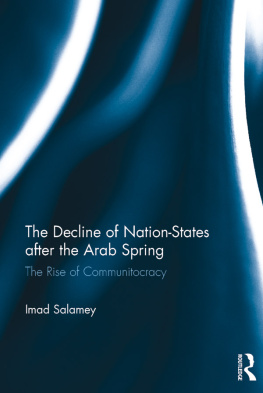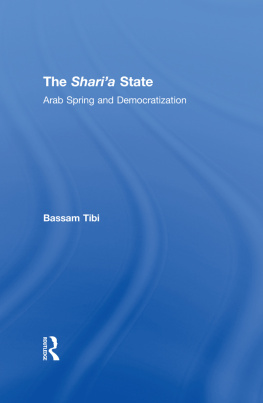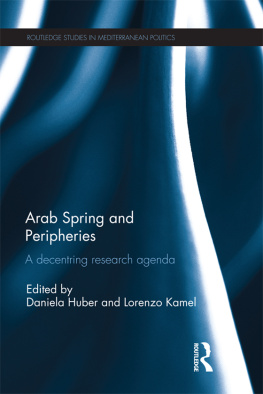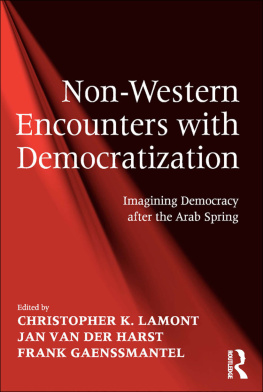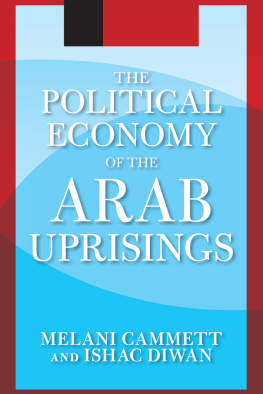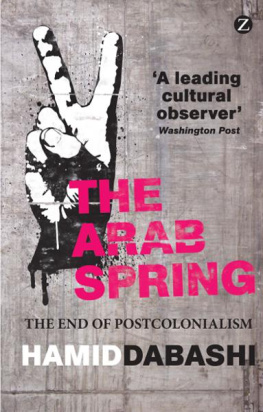The Decline of Nation-States after the Arab Spring
Surveying the causes of the Arab Spring, and revealing the governing trends arising from it, this book examines various international relation theories through the lens of the experiences of the countries in the Middle East and North Africa region. It takes the events of the Arab Spring as an outcome of globalizations double movement whose integrative cultural, political, and security frameworks devastated nationally controlled economies, undermining the nation-state system and propagating a decentralized and communitarian-based governance structure. The consequences for many plural, diverse societies were twofold: autocratic nationalism was discarded while decentralized regimes representing communitarian-based politics came to the fore. The author reveals how the formulation of a new communitocratic order rests on the accommodation of this newly rising communitarianism and explores the major drivers of political transformation, describing the emerging communities and forecasting their governing options and the possible repercussions for the post-Arab Spring states.
Imad Salamey is Associate Professor of Political Science and International Affairs and the Director of the Institute for Social Justice and Conflict Resolution at the Lebanese American University, Lebanon.
Imad Salamey has written a thoughtful and thought-provoking book. Much has been written on the consequences and directions of the Arab Spring since 2011. Salamey offers new and original interpretations, seeing the 2011 uprisings as part of longer-term processes of globalization that first strengthened and then unleashed communitarian forces across the Middle East. Regardless of whether or not one agrees with Salameys conclusions, his examination of the forces leading to and consequences arising from the Arab Spring is essential to a better understanding of the contemporary Middle East. I strongly recommend the book.
Mehran Kamrava, Georgetown University, Qatar
This book provides an outstanding analysis of the decline of state power in the Middle East and North Africa and the emergence of religious and linguistic communities as the dominant players in the region. It makes a persuasive case for this new communitarianism to take the integrative form of peaceful power-sharing. I can give my strong recommendation for this thoughtful and provocative work.
Arend Lijphart, Research Professor Emeritus of Political Science, University of California, USA
Salamey provides clarity and insight into a complicated and dynamic region of the world. His book is highly relevant and timely to what has been unraveling in the MENA region since the collapse of the Cold War. Salamey challenges Western dominated perceptions and narratives, and pushes back against major IR theories that have focused on MENA exceptionalism. He argues that the events in the region are best explained by looking at how globalization has changed the perrequisites for state survival in the 21st century. In particular, how the traditional functions of the state have been transferred to decentralized local communities with globalized networks and interconnectedness, which in turn has led to the communitocratization of Arab politics. Salameys book is a must for academics, policymakers, and students interested in a more nuanced, non-traditional interpretation of political dynamics in the MENA.
Faten Ghosn, Associate Professor, International Relations at the University of Arizona, USA
The Decline of Nation-States after the Arab Spring
The rise of communitocracy
Imad Salamey
First published 2017
by Routledge
2 Park Square, Milton Park, Abingdon, Oxon OX14 4RN
and by Routledge
711 Third Avenue, New York, NY 10017
Routledge is an imprint of the Taylor & Francis Group, an Informa business
2017 Imad Salamey
The right of Imad Salamey to be identified as author of this work has been asserted by him in accordance with sections 77 and 78 of the Copyright, Designs and Patents Act 1988.
All rights reserved. No part of this book may be reprinted or reproduced or utilised in any form or by any electronic, mechanical, or other means, now known or hereafter invented, including photocopying and recording, or in any information storage or retrieval system, without permission in writing from the publishers.
Trademark notice: Product or corporate names may be trademarks or registered trademarks, and are used only for identification and explanation without intent to infringe.
British Library Cataloguing in Publication Data
A catalogue record for this book is available from the British Library
Library of Congress Cataloging-in-Publication Data
A catalog record for this book has been requested
ISBN: 978-1-4724-6811-6 (hbk)
ISBN: 978-1-315-61536-3 (ebk)
Typeset in Times New Roman
by Apex CoVantage, LLC
This work is dedicated to all those who have been forcibly displaced from their homes, having committed no crime other than belonging to a community
Contents
Already in the twenty-first century the Middle East and North Africa (MENA) region has witnessed profound political transformations. Since the Arab Spring erupted in 2010, dramatic events have taken place in almost every Arab state. Figureheads who had monopolized power for decades and comfortably enjoyed widespread public, financial, and military support have been exposed and in some cases toppled. Governments and constitutions have been overthrown, with new alternatives instated.
Across the political map, post-independent states no longer appear the same: Sudan split in two while Iraq, Syria, Yemen, and Libya splintered apart. Drives towards Kurdish independence have gained unprecedented momentum while the Islamic State in Iraq and Syria (ISIS) has expanded territorial control and assumed state functions. Libya has also become defined by deep-seated divisions along a proliferation of tribal and political lines. Yemen has been shattered between Iranian-backed Houthis, the Islamic State, and the Saudi-backed government. Transnational sectarian, ethnic, and tribal wars have erupted, claiming the lives of hundreds of thousands, displacing millions, and driving more than thirty countries worldwide to engage in direct military interventions.
At the same time a worldwide oil war has been ignited, implicating major oil-producing countries vowing to dominate the MENA region and including Saudi Arabia, Iran, the United States, and Russia. Oil prices have plunged to record lows whilst OPEC appears on the verge of total disintegration. In the midst of regional volatility, Saudi Arabia has boosted its military buildup and spending to surpass that of both Russia and Britain. Major wars appear imminent.
In the meantime, the spectre of a Syrian refugee exodus has come to haunt Europe. The European Unions inability to articulate a unified policy towards the inflow of refugees has threatened the very foundations of the Schengen Agreement. Political predicaments in the MENA region are exacting global consequences.
In light of dramatic unraveling events, general theories prevalent in international politics and specific to the MENA region are in dire need of reconsideration in order to interpret contemporary events and developments. Among the pressing questions is whether the MENA region has been undergoing an inter- and intra-clash of civilizations. Or, alternatively, whether a democratic revolution has been set in motion, leading to the demise of autocratic rulers and the adoption of universal human rights.

